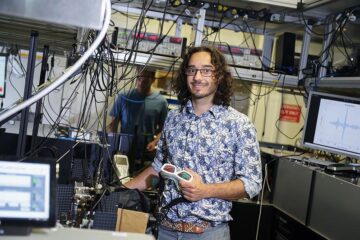Invitation to the Media – String virtuosos gather in Oxford – 1st International Conference on String Phenomenology

Next week the University of Oxford is hosting a meeting of string experts – not in this case well-known musicians, but internationally renowned scientists. The meeting will bring together physicists who are striving to develop a consistent theory of the nature of matter – in other words, the basic building bricks of ourselves and the Universe we inhabit. The main theme will be the application of what is known as „string theory“ – based on fundamental objects that are two-dimensional and therefore „string-like“. In recent years these ideas have become increasingly important as physicists believe that they hold the promise of a mathematically consistent theory of fundamental matter and interactions.
The meeting – the 1st International Conference on String Phenomenology – is being held from 6-11 July 2002. Organised by the Sub-department of Theoretical Physics at Oxford and the Institute for Particle Physics Phenomenology in Durham, it will feature plenary talks reviewing the major topics, as well as parallel sessions for contributed papers describing new results.
One highlight of the conference will be a public lecture, „The eleven dimensional universe of M-theory“, by Professor Michael Duff, who is the Oscar Klein distinguished professor at the University of Michigan and the director of the Michigan centre for theoretical physics. In this talk Professor Duff will describe progress with „M theory“, which describes fundamental objects in an 11-dimensional universe.
Journalists are welcome to attend the talk, which will be held at 20.00 on Tuesday 9 July, in the Martin Wood Lecture Theatre, Clarendon Laboratory, Parks Road, Oxford.
Media Contact
Weitere Informationen:
http://www-thphys.physics.ox.ac.uk/users/AlonFaraggi/conference.htmlAlle Nachrichten aus der Kategorie: Veranstaltungsnachrichten
Neueste Beiträge

Neue universelle lichtbasierte Technik zur Kontrolle der Talpolarisation
Ein internationales Forscherteam berichtet in Nature über eine neue Methode, mit der zum ersten Mal die Talpolarisation in zentrosymmetrischen Bulk-Materialien auf eine nicht materialspezifische Weise erreicht wird. Diese „universelle Technik“…

Tumorzellen hebeln das Immunsystem früh aus
Neu entdeckter Mechanismus könnte Krebs-Immuntherapien deutlich verbessern. Tumore verhindern aktiv, dass sich Immunantworten durch sogenannte zytotoxische T-Zellen bilden, die den Krebs bekämpfen könnten. Wie das genau geschieht, beschreiben jetzt erstmals…

Immunzellen in den Startlöchern: „Allzeit bereit“ ist harte Arbeit
Wenn Krankheitserreger in den Körper eindringen, muss das Immunsystem sofort reagieren und eine Infektion verhindern oder eindämmen. Doch wie halten sich unsere Abwehrzellen bereit, wenn kein Angreifer in Sicht ist?…





















